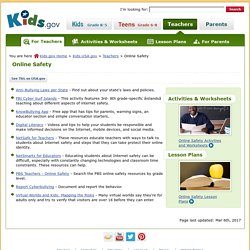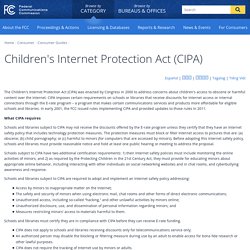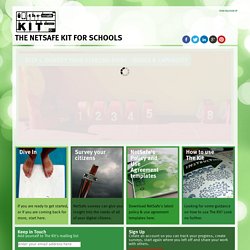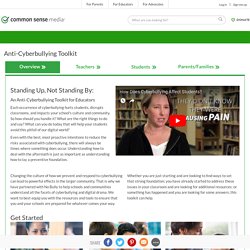

Cyber-safety or cyber-maturity? Teaching ethics in a virtual world #edtech #steam. Accountability & responsibility in a digital world. Educators. Online Safety for Teachers. Anti-Bullying Laws per State - Find out about your state's laws and policies.FBI Cyber Surf Islands - This activity features 3rd- 8th grade-specific âislandsâ teaching about different aspects of internet safety.KnowBullying App - Free app that has tips for parents, warning signs, an educator section and simple conversation starters.Digital Literacy - Videos and tips to help your students be responsible and make informed decisions on the Internet, mobile devices, and social media.NetSafe for Teachers - These resources educate teachers with ways to talk to students about Internet safety and steps that they can take protect their online identity.NetSmartz for Educators - Educating students about Internet safety can be difficult, especially with constantly changing technologies and classroom time constraints.

Teach Online Safety. Federal Communications Commission. The Children's Internet Protection Act (CIPA) was enacted by Congress in 2000 to address concerns about children's access to obscene or harmful content over the Internet.

CIPA imposes certain requirements on schools or libraries that receive discounts for Internet access or internal connections through the E-rate program – a program that makes certain communications services and products more affordable for eligible schools and libraries. In early 2001, the FCC issued rules implementing CIPA and provided updates to those rules in 2011. What CIPA requires Schools and libraries subject to CIPA may not receive the discounts offered by the E-rate program unless they certify that they have an Internet safety policy that includes technology protection measures. The protection measures must block or filter Internet access to pictures that are: (a) obscene; (b) child pornography; or (c) harmful to minors (for computers that are accessed by minors).
Printable Version. SyllabusforProfessionalDevelopment. The netsafe kit for schools. Step 1.

Identify your starting point - Issues & Capability Step 2. Build a secure foundation Step 3. Build Capability Step 4. Step 5. Step 6. Step 7. Dive In Survey your citizens NetSafe’s Policy and Use Agreement templates. Cybersafety. Home of the Georgia ICAC Task Force. Anti-Cyberbullying Toolkit. An Anti-Cyberbullying Toolkit for Educators This free toolkit has the resources schools need to take an effective stand against cyberbullying.

Rely on it to start your year off right. Each occurrence of cyberbullying hurts students, disrupts classrooms, and impacts your school's culture and community. So how should you handle it? What are the right things to do and say? Even with the best, most proactive intentions to reduce the risks associated with cyberbullying, there will always be times where something does occur. Download our Cyberbullying Response Flowchart.Better understand how your school can activate student compassion to help stop cyberbullying with No Bully.Make sure your students have access to help when they need it the most with the Crisis Text Line Flyers.
In partnership with No Bully We have highlighted our cyberbullying lessons for each grade level, along with giving you everything you need to teach engaging lessons for your classroom around this topic. Grades K-5 Lessons. Cyberbullying.